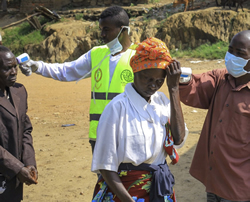Anne Soy* reports on growing concerns among Uganda’s health workers that they have inadequate protection against an outbreak of the Sudan strain of the Ebola virus, for which there is no approved vaccine.
 An outbreak of Ebola in Uganda is proving more difficult to deal with than other recent epidemics, but President Yoweri Museveni has rejected calls for a lockdown.
An outbreak of Ebola in Uganda is proving more difficult to deal with than other recent epidemics, but President Yoweri Museveni has rejected calls for a lockdown.
According to recent figures, more than 30 cases of the often fatal disease have been confirmed, though it is feared that there could be many more.
Ebola spreads between humans by direct contact with bodily fluids and contaminated environments. Funerals can be a particular risk if mourners have direct contact with the body.
Most of the cases identified are in Uganda’s central district of Mubende, where six people have died.
However, the death toll may be higher. Uganda’s Ministry of Health says there were 18 deaths linked to confirmed cases, where burials took place before they could be tested.
Another concern is that this is the Sudan strain of Ebola, for which there is no approved vaccine, unlike the more common Zaire strain.
This means there has been no vaccination of health workers, who account for six of the confirmed cases.
Ebola vaccines developed in the past few years have not been tested on the Sudan strain
The Zaire strain was responsible for the largest-ever outbreak of Ebola, in West Africa from December 2013 to 2016. More than 11,000 people died.
With more than 28,000 cases in Guinea, Liberia and Sierra Leone, scientists carried out intensive research into Ebola vaccines.
Two years after that epidemic ended, the then unlicensed Ervebo vaccine, developed by Merck, was used during an outbreak of the Zaire strain in the west of the Democratic Republic of Congo (DRC).
It was granted clearance by the World Health Organisation, which said it had limited infections and saved lives. A second vaccine by Johnson and Johnson has since been approved for use by the European Medicines Agency.
However, neither of these vaccines has been tested against the Sudan strain.
Uganda’s focus is on contact tracing — finding those who have been in close proximity with patients, especially those who attended the community funerals.
Mr Museveni said two mobile laboratories have been sent to Mubende so that people would not have to travel for tests and risk spreading the virus.
Medical personnel have expressed concern about the lack of adequate personal protective equipment such as gloves and masks. They have also called for the affected region to be put under quarantine.
However, Mr Museveni says restrictions are not needed as Ebola is not an airborne disease like COVID-19 and markets, schools and places of worship would remain open.
He urged people to observe personal hygiene and avoid close contact with victims.
*Anne Soy is the British Broadcasting Corporation’s Senior Africa Correspondent. She reports across the continent for BBC Global and United Kingdom domestic television and radio programs, as well as digital platforms.
This article first appeared on the BBC Africa website.




